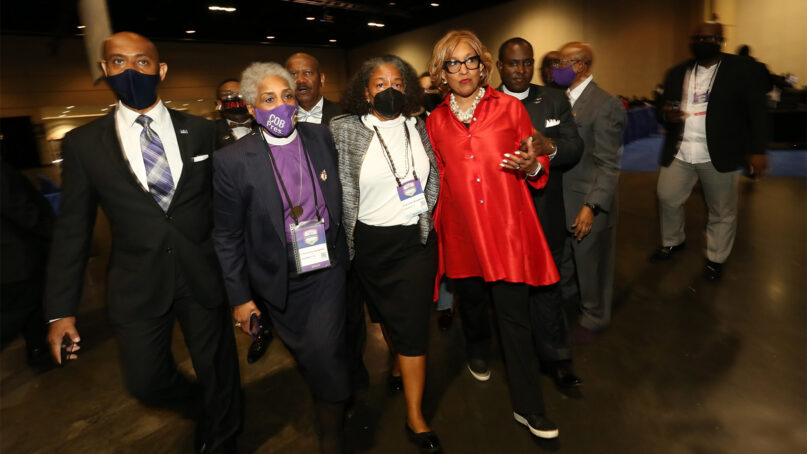(RNS) — Women in Black Baptist circles knew that it was a matter of time before one of their own was named to lead a major church organization.
Female clergy describe having a sense of anticipation for years before this summer’s elevation of the Rev. Gina Stewart to president of the Lott Carey Baptist Foreign Missionary Society, a 124-year-old movement of about 10,000 volunteers and contributors based in Maryland.
“We knew Gina Stewart was going to become the president in 2021,” said the Rev. Leslie Callahan, pastor of St. Paul’s Baptist Church in Philadelphia. Callahan said “there was excitement and energy” as Stewart rose in the ranks of the society from second vice president to first vice president to its top position.
“We looked forward to this day, only to have it deeply disrupted by COVID. I would have gone to Atlanta were it not for COVID and living with an unvaccinated child,” said Callahan of the location of the society’s annual meeting.
But questions remain about where Black denominations stand on women’s leadership.
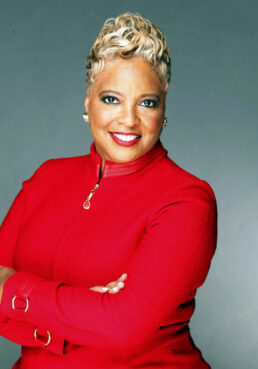
The Rev. Gina Stewart. Courtesy photo
While the African Methodist Episcopal Church consecrated its first female bishop more than two decades ago, the AME Zion Church, a separate denomination, was recently criticized for not maintaining women in top leadership roles when its general conference met this summer. AME Zion members have a sole female bishop, the Rt. Rev. Mildred “Bonnie” Hines, in addition to a woman at the head of an all-female organization. The Progressive National Baptist Convention has never had a woman in its top post, though its male leaders hailed the importance of women at more than one session of their recent meeting.
Stewart, a Memphis, Tennessee, pastor, admits her election remains unusual in the Baptist world and beyond it.
RELATED: Gina Stewart becomes first woman elected to lead US Black Baptist organization
“While there are exceptions, I think that whenever a woman rises, or ascends, to a leadership position in a national organization, it’s always significant,” she said in an interview shortly after her installation. “Because we know that, typically, as it relates to women moving up in leadership in organizations that are typically male-dominated spaces, that is still very rare.”
The Pew Research Center, in its February report on “Faith Among Black Americans,” found that significant majorities of Black women (87%) and men (84%) believe women should be permitted to serve in congregations as senior religious leaders. But the National Congregations Study reported that only 16% of Black Protestant churches in 2018-19 were led by women.
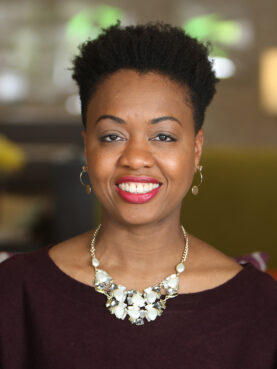
The Rev. LaKesha Womack. Courtesy photo
The Rev. LaKesha Womack, a North Carolina business consultant and ordained AME Zion deacon who ran unsuccessfully for a general officer position, said of the 2021 meeting, “The frustration is that there isn’t diversity in leadership in the organization, not necessarily myself, but the fact that we haven’t elected any other women.”
She added: “At the decision-making tables, there are not going to be very many female voices for an international organization.”
Bishop Kenneth Monroe, the senior bishop of the denomination that dates to 1796, said: “We don’t have any problem with ladies in leadership in our church. None.”
He pointed to Julia Foote, who was ordained in the denomination as a deacon and, later, an elder in the late 1890s.
“It’s just unfortunate that we didn’t elect anybody this time but I’m sure, in times to come, we will elect another lady as a bishop and as an officer in the church,” he added, noting his personal efforts to appoint women and men to leadership positions, including as regional presiding elders. “I have been very, very intentional about trying to place men and women in leadership because we need both to lead our church.”
Talk of intentions was also heard during a Social Justice Commission forum as the Progressive National Baptist Convention met virtually earlier this summer.
“We’ve been very intentional that this panel would reflect the genius in the voices, the minds, the hearts, the spirits of the women,” said the Rev. Frederick D. Haynes III, moderator of the discussion, which included Callahan, the Philadelphia pastor.
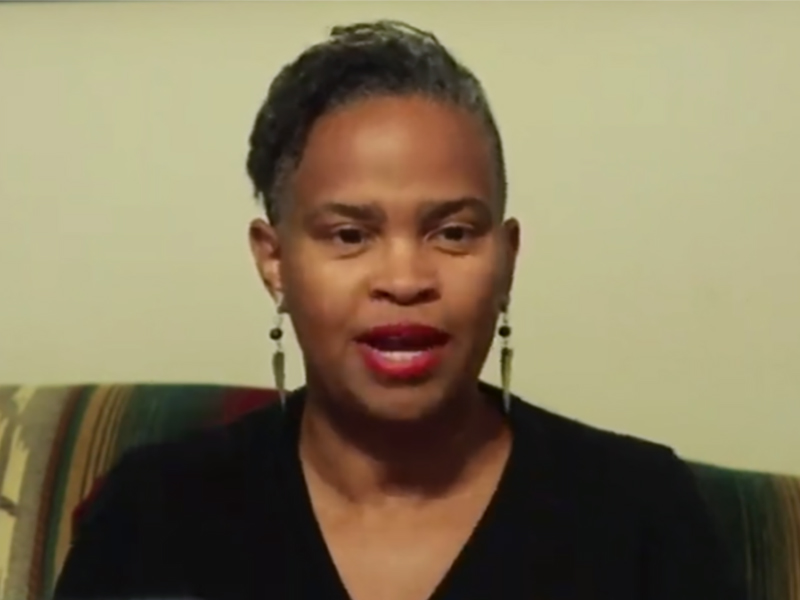
The Rev. Leslie Callahan speaks during a PNBC Social Justice Commission panel on Aug. 5, 2021. Video screen grab
Two days before, during a PNBC conversation among current and past presidents, former leader Ralph W. Canty Sr. implied that the time for intentions alone had passed.
“We have embraced women in ministry but 60 years later, we have not yet elected a woman a president of this convention. Sixty years later we have not elected a woman vice president of this convention — why not?” he asked. “It’s time now for us to take the next step and move forward.”
Callahan said others in the PNBC have raised these questions, but talk of a “theoretical woman” has not yet led to an actual female leader. She compared denominational discussions to the years in the broader culture before Kamala Harris, a Black and South Asian woman, was elected the first female U.S. vice president.
“I have heard people, in particular, recognize and articulate that there’s something that feels inconsistent about being a denomination that identifies as progressive, but not having made these strides, not having made these steps,” said Callahan, who is the fifth pastor and first female leader of her Philadelphia church, which is dually affiliated with the PNBC and the American Baptist Churches in the U.S.A.
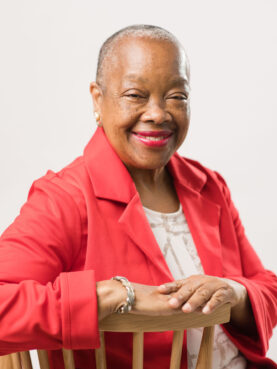
The Rev. Valerie Bridgeman. Courtesy photo
The Rev. Valerie Bridgeman, dean of the Methodist Theological School in Ohio, said women’s leadership is a challenge within all church groups, historically Black or not.
“There are pockets of almost every denomination that is super conservative around the role of women in leadership and it’s true because of the way they read the Bible,” said Bridgeman, who founded WomanPreach! Inc., which trains women of African descent. “So, sexism gets sanctified by using the sacred texts or, I would say, misusing the sacred texts, without actually seeing people’s gifts as leading and not their genitalia.”
Some members of the AME Church, which elected Bishop Vashti McKenzie its first female prelate in 2000, were angry when the denomination came close to electing no women among its four new bishops at its meeting this summer. But with McKenzie’s retirement the total number of women bishops remains at two.
The Rev. Erika Crawford, international president of AME Women in Ministry, said she was “incensed” when candidates who had pulled out of the race supported other male candidates instead of women who had received significant votes in earlier balloting. Four of the original 22 candidates were women.
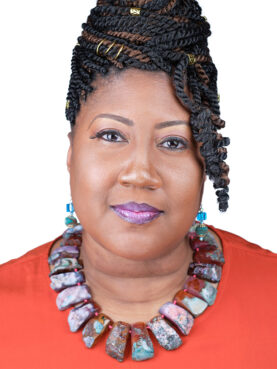
The Rev. Erika Crawford. Courtesy photo
Crawford explained what it can take to elect a female bishop in today’s church world. With two slots left and two men already elected, she said, “we began to rally and to use our influence, and to call on our allies to ensure that a woman, a qualified woman, was seated on the bench,” the Delaware pastor said. For about 10 tense minutes the women’s advocates texted other delegates who were watching online from different rooms in the Florida convention center and as far away as Africa.
Crawford said she was elated when the Rev. Francine A. Brookins, the first biracial AME bishop and the daughter of a bishop, was elected.
“I think it was a wonderful thing because it made a statement that the church is still moving forward, that we’re not going to regress for a handful of people,” she said. “We will remain progressive in our quest for parity and representation in the church.”
This story has been updated.
